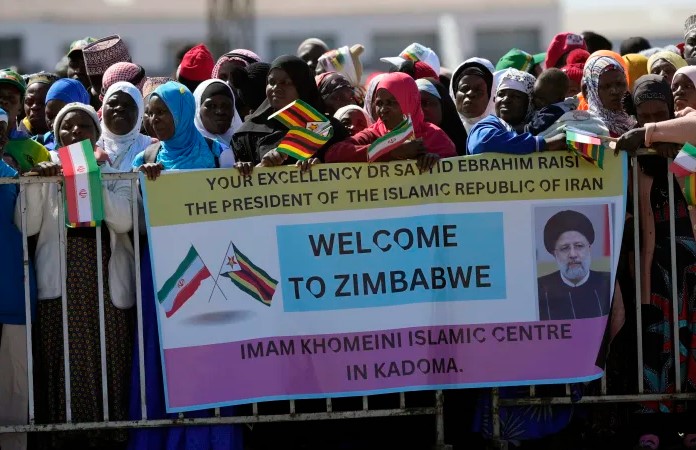Iranian President Ebrahim Raisi received a warm welcome as he arrived in Zimbabwe, marking the final leg of his Africa tour. This visit, the first by an Iranian leader in 11 years, aims to strengthen diplomatic ties and alleviate the international isolation faced by both Iran and Zimbabwe. Raisi’s plane touched down at Harare’s Robert Mugabe International Airport, where he was greeted by Zimbabwean President Emmerson Mnangagwa, who expressed gratitude for the Iranian leader’s show of solidarity.
The airport reception was attended by hundreds of people, including members of Zimbabwe’s Muslim community, who waved Zimbabwean and Iranian flags, while women wearing headscarves and school children held welcome banners. Mnangagwa, who is seeking re-election in August, emphasized the historical friendship between Iran and Zimbabwe, referencing their alliance during Zimbabwe’s struggle for independence from Britain. Mnangagwa stated, “When we went to war Iran was our friend. I am happy you have come to show solidarity.” The two leaders engaged in talks following the warm welcome.
Prior to his arrival in Zimbabwe, Raisi had visited Kenya and Uganda, engaging in discussions with Kenyan President William Ruto and Ugandan President Yoweri Museveni. Africa has become a diplomatic battleground as Russia and the West vie for support amid Russia’s invasion of Ukraine, which has had severe economic consequences on the continent, leading to a surge in food prices. Western powers, as well as India and China, have been seeking to strengthen trade relations with African nations.

Nasser Kanani, spokesperson for the Iranian Foreign Ministry, referred to Raisi’s African tour as a significant turning point that could foster economic and trade ties between Iran and African countries. Kanani also highlighted the shared political views among Iran and the three African nations visited by Raisi. The Zimbabwean Foreign Ministry stated that several agreements are expected to be signed during the Iranian leader’s one-day trip, signifying the deepening of ties between the two nations.
Both Iran and Zimbabwe face heavy economic sanctions from the United States, contributing to their international isolation. Raisi’s visit to Africa underscores Iran’s efforts to establish new partnerships and mitigate the impact of these punitive measures. The trip also demonstrates the existing joint permanent commission on political and trade relations between Iran and Zimbabwe. Furthermore, the two countries share a historical connection, as Mnangagwa expressed gratitude to Iran for their support during Zimbabwe’s liberation war in the 1970s, leading to the nation’s independence from white minority rule.
Upon Raisi’s arrival, his supporters, waving Zimbabwean and Iranian flags, gathered at the airport. They voiced their criticism of the West, referring to them as “white masters” attempting to meddle in Zimbabwe’s affairs. The Iranian leader inspected an honor guard formed by Zimbabwe’s military and was warmly received by members of Zimbabwe’s Muslim community.
During his visit to Uganda, Raisi made strong remarks denouncing Western support for homosexuality and LGBTQ+ rights, considering it “one of the dirtiest things.” He praised Uganda’s recent legislation against homosexuality and expressed interest in cooperation between Iran and Uganda on this issue. Similarly, Zimbabwe also has anti-gay laws, and both countries criminalize homosexuality and same-sex marriages. Notably, Mnangagwa has refrained from attacking homosexuality, in contrast to his predecessor, the late Robert Mugabe, who vehemently condemned homosexuality.
The previous visit by an Iranian leader to Zimbabwe occurred in 2010 when then-President Mahmoud Ahmadinejad paid a visit to the country.







